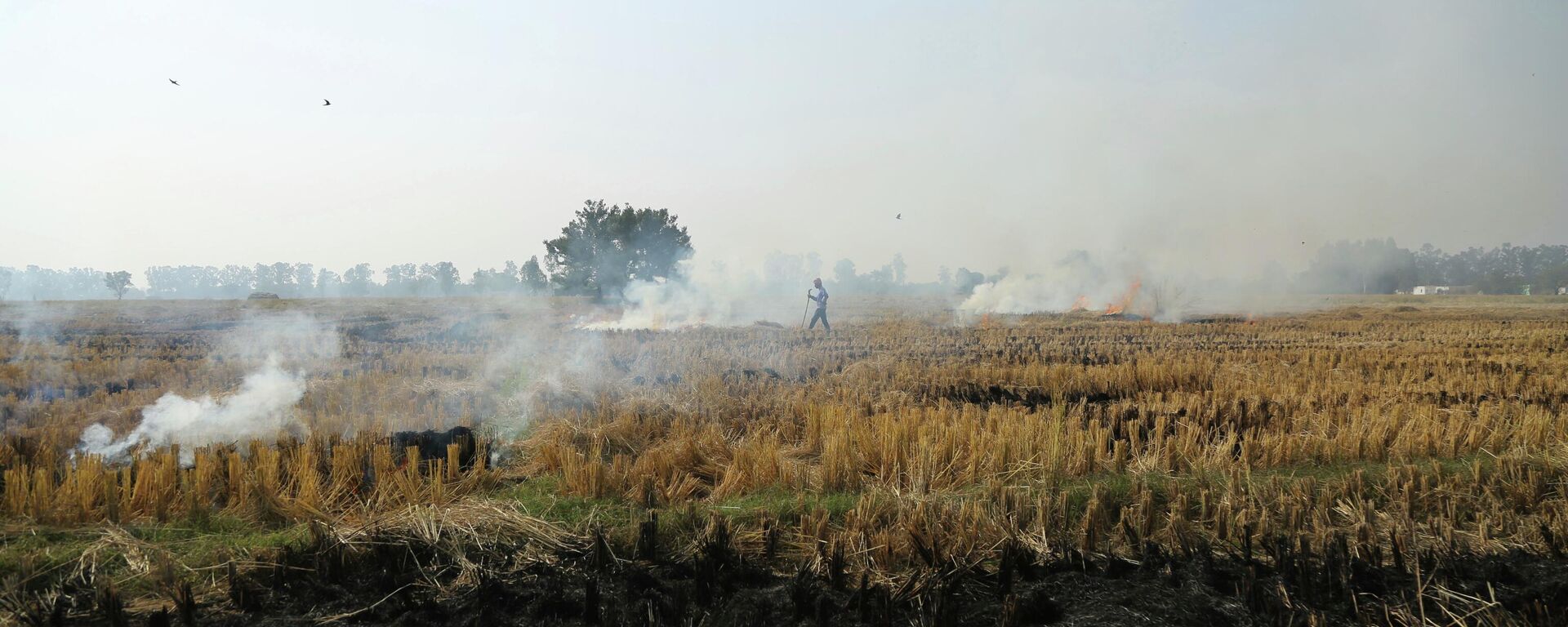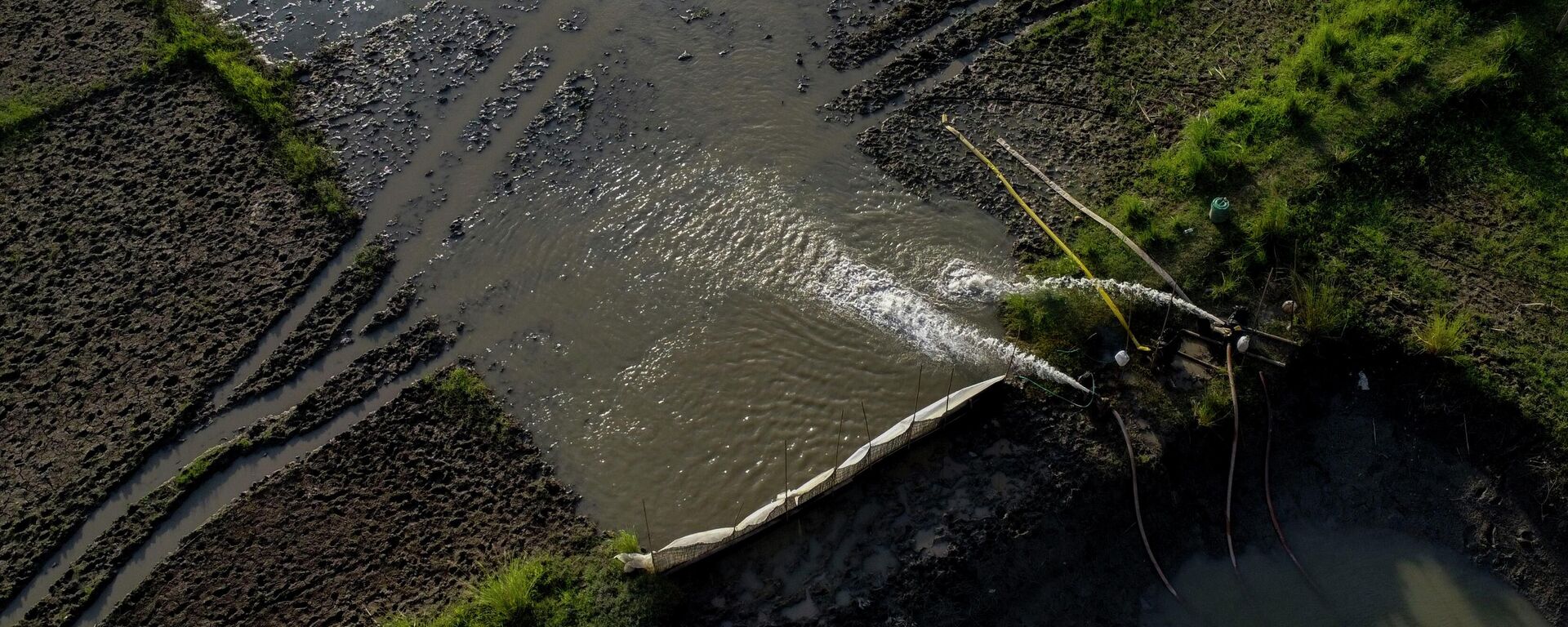https://sputnikglobe.com/20221026/other-states-could-learn-from-keralas-experience-in-supporting-coffee-farmers-1102666227.html
Other States Could Learn From Kerala's Experience in Supporting Coffee Farmers
Other States Could Learn From Kerala's Experience in Supporting Coffee Farmers
Sputnik International
India is among the world’s top 10 coffee-producing countries, with the industry reportedly providing employment to around two million people. Over the past few... 26.10.2022, Sputnik International
2022-10-26T12:45+0000
2022-10-26T12:45+0000
2024-01-05T15:11+0000
india
coffee
coffee consumption
coffee
kerala
farmers
production
production factory
https://cdn1.img.sputnikglobe.com/img/07e6/0a/1a/1102668160_0:183:3317:2048_1920x0_80_0_0_a4f43c461a588cae2d1a484a4dd1706d.jpg
All India Kisan Sabha (AIKS), a farmer front of the Communist Party of India, is organizing the first All India Conference of Coffee Farmers' Federation of India in the Wayanad district in Kerala this week.Representatives from different parts of the country are expected to participate in discussions about longstanding issues for coffee growers.Ahead of the conference, Sputnik spoke with AIKS Finance Secretary P. Krishnaprasad about key topics on the agenda and the issues Indian coffee farmers are facing today.Sputnik: Why did All India Kisan Sabha decide that such conference should be organized at this time?Krishnaprasad: This is not the first initiative of All India Kisan Sabha (AIKS), as far as crop-wise mobilization is concerned. In 2017, during the 34th Conference of AIKS in Hisar, we found a change in agricultural patterns. It was found that mono-cultivation has been spread all over the country due to capitalist intervention in agriculture. One crop was cultivated in one area. So, the farmers of that particular crop were having particular problems.A general farmers’ organization was not able to cater to [farmers' needs], therefore, there was a need for someone to raise their demands. All the members of AIKS have said that the need of the hour was crop-wise mobilization.Since then, we have been working on crop-wise mobilization: for example, we had a convention of rubber farmers in Kerala in 2018. Similarly, we mobilized jute farmers and also had a convention of dairy farmers in Kerala in June 2022 and apple farmers in Srinagar in July 2022.We have now decided that the same strategy will be adopted for farmers of each and every crop.Sputnik: What issues are at the top of the conference's agenda?Krishnaprasad: The issues on top of the agenda will be corporate domination, appropriation of the surplus and producer cooperatives of small farmers and plantation workers.For example, instant coffee powder (a value-added coffee industry product) is sold for INR 500 to 3,000 ($6 to $36), while some of the brands are even selling it for INR 4,000 to 6,000 ($48 to $72) per kilogram. One must understand that 2.5 kilograms of green beans are required to make one kilogram of instant coffee powder and farmers get only INR 160 to 180 ($1.94 to $2.18) for it. They get this after some increase in the international prices last year. Earlier, it was much less.We saw a huge crisis in Wayanad when more than 3,000 farmers committed suicide between 1999 and 2007. At the time, the price for Robusta coffee beans was INR 24 ($0.29) per kilo. So the corporate sector was purchasing the bean for INR 60 ($0.73) (as 2.5 kg of beans is required to make one kg of instant coffee powder), while they were selling it for INR 1,400 ($16.98). So, this was the degree of appropriation of the surplus.Therefore, the discussion will be around the dominance of corporate forces in the coffee industry, while another issue [to be raised] is about the 102nd report of a parliamentary committee, submitted in 2012, which recommended that the government promote producer cooperatives to support small farmers in order to protect coffee farmers and the coffee industry.Along with these, we will also discuss issues like credit, insurance, wildlife attack, climate change, and productivity.Sputnik: Coffee growers fall under the Ministry of Commerce. Do you demand that they be put under the Ministry of Agriculture? How would it help boost the fortunes of coffee growers?Krishnaprasad: Coffee growers under the Ministry of Commerce are not getting benefits at all -- they actually stand by corporate interests, supporting and facilitating their policy of profiteering without considering the importance of smaller farmers.Apart from this, coffee growers are not getting benefits like credit facilities or subsidies, or any others.So, we have come to the conclusion that firstly, the term “coffee growers” should be replaced with “coffee farmers,” and benefits provided by the state agriculture departments should be available to them.Therefore, shifting coffee farmers from the Commerce Ministry to Agriculture Ministry is one of our demands.When I say surplus sharing, I mean that if instant coffee powder is being sold at INR 3,000 ($36), then 30 percent of it should go to the farmers. As of now, they are getting below INR 300 ($3.64).All political parties should debate on the bill and the government should make it clear where it stands on sharing 30 percent of the surplus with the peasantry.We also request the federal government, as well as other state governments, to adopt Kerala's model of helping farmers and facilitating producer and marketing cooperatives.The Kerala government has already started establishing producer cooperatives and has brought up a project worth INR five billion ($60,650,250), the carbon neutral coffee project in Wayanad. It has also announced the launch of the Climate Smart Coffee Project and Coffee Park in Wayanad.Sputnik: Coffee production in India has decreased. What could the major reasons behind the downward trend be, and do you think climate change is one of them?Krishnaprasad: Experts have suggested that there has been a decline in coffee production due to heavy monsoons in the past three years, since coffee is a very "climate-sensitive" crop.However, instead of blaming climate [change] for the decline in production, we should [note] that we don’t have enough irrigation facilities for coffee cultivation. If [more] irrigation facilities are developed, then water could be provided to small farmers and they would yield good crops.Although there is a coffee board representing coffee growers, it is not functioning as a very vibrant organization, since they have a lot of responsibility. So, it is all about a lack of pro-farmer policies.The actual reason behind the decline in production is the inability of the government system to provide facilities to small farmers.Along with that, a lot of coffee farmers are not encouraged to cultivate coffee because of its non-profitable character. There is less employment in the sector, and farmers become migrant workers. They don’t even get minimum wage, so there is a scarcity of labor.Moreover, farmers are unable to invest in coffee cultivation, therefore I can say that coffee farmers in India are in a real crisis, while the corporate sector is reaping huge profits.The views expressed in this interview are those of the speaker and do not necessarily reflect the position of Sputnik.
https://sputnikglobe.com/20221024/govt-should-help-alter-decades-old-traditions-encourage-indian-farmers-not-to-burn-stubble-1102499012.html
https://sputnikglobe.com/20221011/indias-bks-farmer-body-calls-for-removal-of-key-tax-on-agricultural-items-1101716665.html
kerala
Sputnik International
feedback@sputniknews.com
+74956456601
MIA „Rossiya Segodnya“
2022
Rahul Trivedi
https://cdn1.img.sputnikglobe.com/img/07e5/05/12/1082926121_0:-1:627:627_100x100_80_0_0_d882e1a63f627c25b7a534fb8b8234d7.jpg
Rahul Trivedi
https://cdn1.img.sputnikglobe.com/img/07e5/05/12/1082926121_0:-1:627:627_100x100_80_0_0_d882e1a63f627c25b7a534fb8b8234d7.jpg
News
en_EN
Sputnik International
feedback@sputniknews.com
+74956456601
MIA „Rossiya Segodnya“
Sputnik International
feedback@sputniknews.com
+74956456601
MIA „Rossiya Segodnya“
Rahul Trivedi
https://cdn1.img.sputnikglobe.com/img/07e5/05/12/1082926121_0:-1:627:627_100x100_80_0_0_d882e1a63f627c25b7a534fb8b8234d7.jpg
india, coffee, coffee consumption, coffee, kerala, farmers, production, production factory
india, coffee, coffee consumption, coffee, kerala, farmers, production, production factory
Other States Could Learn From Kerala's Experience in Supporting Coffee Farmers
12:45 GMT 26.10.2022 (Updated: 15:11 GMT 05.01.2024) India is among the world’s top 10 coffee-producing countries, with the industry reportedly providing employment to around two million people. Over the past few years, however, India's coffee production has decreased, putting a strain on local farmers.
All India Kisan Sabha (AIKS), a farmer front of the Communist Party of India, is organizing the first All India Conference of Coffee Farmers' Federation of India in the Wayanad district in Kerala this week.
Representatives from different parts of the country are expected to participate in discussions about longstanding issues for coffee growers.
Ahead of the conference, Sputnik spoke with AIKS Finance Secretary P. Krishnaprasad about key topics on the agenda and the issues Indian coffee farmers are facing today.
Sputnik: Why did All India Kisan Sabha decide that such conference should be organized at this time?
Krishnaprasad: This is not the first initiative of All India Kisan Sabha (AIKS), as far as crop-wise mobilization is concerned. In 2017, during the 34th Conference of AIKS in Hisar, we found a change in agricultural patterns. It was found that mono-cultivation has been spread all over the country due to capitalist intervention in agriculture. One crop was cultivated in one area. So, the farmers of that particular crop were having particular problems.
A general farmers’ organization was not able to cater to [farmers' needs], therefore, there was a need for someone to raise their demands. All the members of AIKS have said that the need of the hour was crop-wise mobilization.
Since then, we have been working on crop-wise mobilization: for example, we had a convention of rubber farmers in Kerala in 2018. Similarly, we mobilized jute farmers and also had a convention of dairy farmers in Kerala in June 2022 and apple farmers in Srinagar in July 2022.
We have now decided that the same strategy will be adopted for farmers of each and every crop.
Sputnik: What issues are at the top of the conference's agenda?
Krishnaprasad: The issues on top of the agenda will be corporate domination, appropriation of the surplus and producer cooperatives of small farmers and plantation workers.
Coffee is the second largest profit-making commodity in the world after petroleum, but coffee farmers are always at the receiving end. They don’t get the proper remuneratory price.
For example, instant coffee powder (a value-added coffee industry product) is sold for INR 500 to 3,000 ($6 to $36), while some of the brands are even selling it for INR 4,000 to 6,000 ($48 to $72) per kilogram. One must understand that 2.5 kilograms of green beans are required to make one kilogram of instant coffee powder and farmers get only INR 160 to 180 ($1.94 to $2.18) for it. They get this after some increase in the international prices last year. Earlier, it was much less.
Not only instant coffee powder, but if we see retail prices of coffee like cappuccino, espresso, Americano, then only two percent or even less of the end value is shared with the farmers. So, this is the highest appropriation of surplus.

24 October 2022, 08:34 GMT
We saw a huge crisis in Wayanad when more than 3,000 farmers committed suicide between 1999 and 2007. At the time, the price for Robusta coffee beans was INR 24 ($0.29) per kilo. So the corporate sector was purchasing the bean for INR 60 ($0.73) (as 2.5 kg of beans is required to make one kg of instant coffee powder), while they were selling it for INR 1,400 ($16.98). So, this was the degree of appropriation of the surplus.
Therefore, the discussion will be around the dominance of corporate forces in the coffee industry, while another issue [to be raised] is about the 102nd report of a parliamentary committee, submitted in 2012, which recommended that the government promote producer cooperatives to support small farmers in order to protect coffee farmers and the coffee industry.
Along with these, we will also discuss issues like credit, insurance, wildlife attack, climate change, and productivity.
Sputnik: Coffee growers fall under the Ministry of Commerce. Do you demand that they be put under the Ministry of Agriculture? How would it help boost the fortunes of coffee growers?
Krishnaprasad: Coffee growers under the Ministry of Commerce are not getting benefits at all -- they actually stand by corporate interests, supporting and facilitating their policy of profiteering without considering the importance of smaller farmers.
Apart from this, coffee growers are not getting benefits like credit facilities or subsidies, or any others.
Since coffee growers are under the Federal Ministry of Commerce, state governments are also not able to pass on any benefit to the farmers of their respective states.
So, we have come to the conclusion that firstly, the term “coffee growers” should be replaced with “coffee farmers,” and benefits provided by the state agriculture departments should be available to them.
Therefore, shifting coffee farmers from the Commerce Ministry to Agriculture Ministry is one of our demands.

11 October 2022, 12:48 GMT
When I say surplus sharing, I mean that if instant coffee powder is being sold at INR 3,000 ($36), then 30 percent of it should go to the farmers. As of now, they are getting below INR 300 ($3.64).
All political parties should debate on the bill and the government should make it clear where it stands on sharing 30 percent of the surplus with the peasantry.
We also request the federal government, as well as other state governments, to adopt Kerala's model of helping farmers and facilitating producer and marketing cooperatives.
The Kerala government has already started establishing producer cooperatives and has brought up a project worth INR five billion ($60,650,250), the carbon neutral coffee project in Wayanad. It has also announced the launch of the Climate Smart Coffee Project and Coffee Park in Wayanad.
This way, the Kerala state government has made it clear that it stands by the interest of coffee farmers and similarly other state governments should also make their stance clear.
Sputnik: Coffee production in India has decreased. What could the major reasons behind the downward trend be, and do you think climate change is one of them?
Krishnaprasad: Experts have suggested that there has been a decline in coffee production due to heavy monsoons in the past three years, since coffee is a very "climate-sensitive" crop.
However, instead of blaming climate [change] for the decline in production, we should [note] that we don’t have enough irrigation facilities for coffee cultivation. If [more] irrigation facilities are developed, then water could be provided to small farmers and they would yield good crops.
Although there is a coffee board representing coffee growers, it is not functioning as a very vibrant organization, since they have a lot of responsibility. So, it is all about a lack of pro-farmer policies.
The actual reason behind the decline in production is the inability of the government system to provide facilities to small farmers.
Along with that, a lot of coffee farmers are not encouraged to cultivate coffee because of its non-profitable character. There is less employment in the sector, and farmers become migrant workers. They don’t even get minimum wage, so there is a scarcity of labor.
Moreover, farmers are unable to invest in coffee cultivation, therefore I can say that coffee farmers in India are in a real crisis, while the corporate sector is reaping huge profits.
The views expressed in this interview are those of the speaker and do not necessarily reflect the position of Sputnik.




